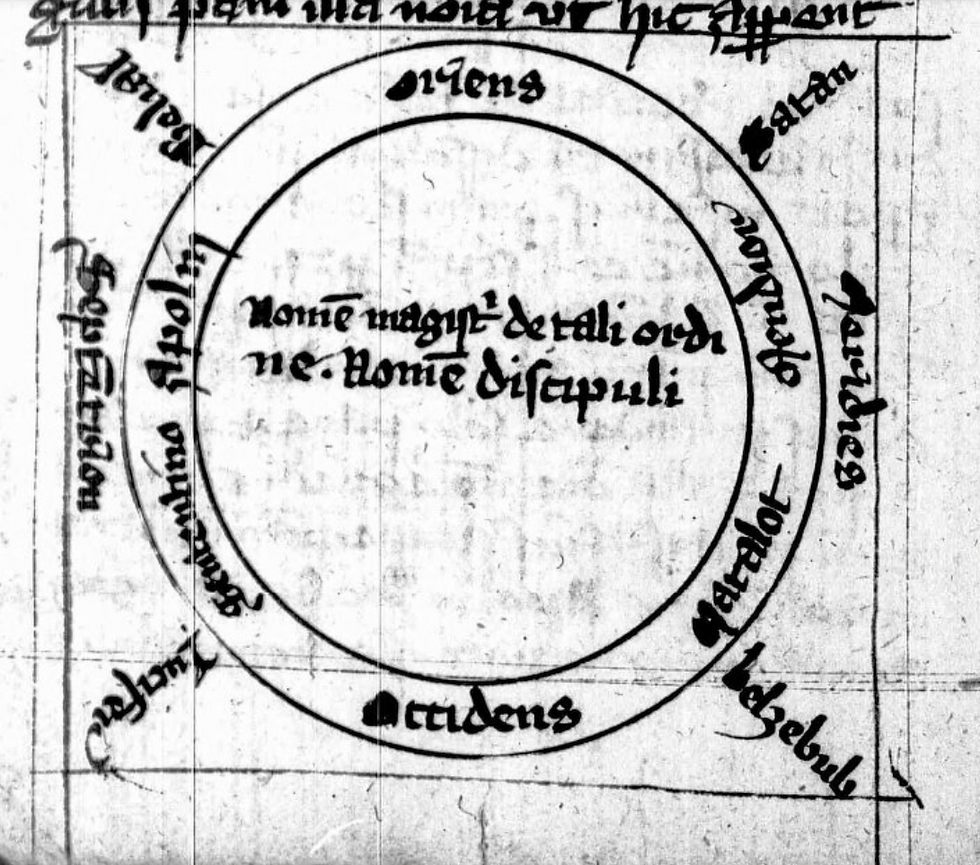The Tale of King Constant
- Zoe Franznick

- Oct 1, 2022
- 8 min read
This week, we explore the short tale of King Constant. This Byzantine era-tale contains strange instances of reverse-engineered divination and teenage mail-fraud in addition to some romance tropes we’re already familiar with.

This story is in a small collection entitled Aucassin and Nicolette and other Medieval Romances and Legends, and comes from the French chivalric tradition, although the tale itself is much older. A cross between the folktale tradition in the Gesta Romanorum and the French chivalric tradition of the Lais of Marie de France, this tale combines both traditions into an absurdist fairy tale.
With these themes in mind, let’s dive into the tale itself:
In the city of Byzantium, before it was called Constantinople, there was a pagan emperor who was learned in a science called astronomy, and knew the courses of the stars, the planets and the moon. It chanced that the Emperor Muselin fared forth one night, he and a certain lord of his together, and went their ways about this city of Constantinople, and the moon shone very clear.
They heard a Christian woman, travailing of child, cry aloud as they passed before her house; but the husband of this dame was set in the terrace upon his roof, and now he prayed God to deliver her from her peril, and again he prayed that she might not be delivered. The two wondered about this, and asked him why he did so.
"Sire," answered he, "I will tell you readily. I know much of a science that men call astrology, and thus I knew well that were my wife delivered in that hour when I prayed God to close her womb, then the child must be for ever lost, and certainly would he be hanged, or drowned, or set within the fire. But when I saw the hour was good, and the case fair, then I prayed God that she might be delivered; that the child born in this place shall have to wife the daughter of the Emperor of this town, she who was born but eight days since, and shall become Emperor and lord of this city, and of the whole world.”
Then they went from the house, but the Emperor commanded his knight that he should bear away the child in so privy a manner, if he were able, that none should see the deed. Then the Emperor struck the child with a knife, wounding him from the stomach to the navel, protesting to the knight that never should son of such a miscreant have his daughter to wife, nor come to sit upon his throne.
However, the knight took the child, wrapped him in a piece of embroidered silk, and set him, swathed in the silken cloth, on a warm muck-heap, before the gate of a certain abbey of monks. The monks found the child and sent for physicians, and inquired of them at what cost they would cure the child of his hurt; and they asked of him one hundred pieces of gold. But he answered that such a sum was beyond his means, and that the saving of the child would prove too costly. Then he made a bargain with the surgeons to heal the child of his wound for eighty golden pieces; and afterwards he brought him to the font, and caused him to be named Constant, because of his costing the abbey so great a sum to be made whole.
The child grew well and fair, and passed all his class-mates in aptness and knowledge. Now it chanced that the Abbot wished to complain to the Emperor of a certain wrong that his servants had done to the abbey, so he went to the castle and took Constant with him. The emperor asked who the child was, and the abbot told him the story of how they found the child and healed him,
When the Emperor heard this story he knew well that it was the child whom he had sought to slay in so felon a fashion; so he prayed the Abbot to give the lad to his charge. The Abbot agreed, and so Constant came to live with the emperor.
When the Emperor held Constant in his power, he pondered deeply how he might slay him, and no man speak a word. It chanced at this time that the Emperor had business which called him to the frontier of his realm, a very long way off, a full twelve days' journey. He set Constant forth with a letter, reading:
"I, the Emperor of Byzantium, and lord of Greece, make him, the governor of my city, to know that as soon as he shall read this letter he shall slay, or cause to be slain, the bearer of this letter, forthwith, upon the delivery thereof. As your proper body to you is dear, so fail not this command.”
Such was the letter Constant carried, and little he knew that it was his death he held in hand. He took the warrant, which was closely sealed, and set out upon his way, riding in such manner that in less than fifteen days he reached Byzantium, the town we now call Constantinople. He came with his horse to the palace garden, and the weather was very hot, for it was near to Midsummer day, and wanting to rest, Constant fell asleep under a tree.
Now it happened that when the fair daughter of the Emperor had dined, she entered the garden, and with her four of her maidens. When the Princess saw Constant, she would not willingly withdraw her eyes, saying to her own heart that never in her life had she beheld so comely a person. Then she called to her one of her companions, and remarked on his beauty, and noted that he was a courier for the emperor.
The two damsels came near the sleeping lad, and softly withdrew the letter. When the Princess read the warrant she began to weep very bitterly, and said to her companion, "Certainly this is a heavy matter. I will put within his girdle another letter from my father in place of this, bidding the castellan to give me as wife to this comely youth, and to call all the people of this realm to the wedding banquet; for be sure that the youth is loyal and true, and a man of peerage.”
The fair maiden, the daughter of the Emperor, went straight to her wedding chest, and drew therefrom one of the sealed parchments left her by her father, so that she might borrow moneys in his name should occasion arise. For, always was this king and his people at war with felon and mighty princes whose frontiers were upon his borders.
Thereon she wrote her letter in such manner as this— "I, King Muselin, Emperor of Greece and of Byzantium the great city, to my Castellan of Byzantium greeting. I command you to give the bearer of this letter to my fair daughter in marriage, according to our holy law; for I have heard, and am well persuaded, that he is of noble descent and right worthy the daughter of a king. And, moreover, at such time grant holiday and proclaim high festival to all burgesses of the city, and throughout my realm.”
Then, waking Constant, she took him to the castellan and bid him deliver the letter, and this she said innocently as one who knew nothing of what was therein. To this the castellan agreed, so he and the maiden passed to the council chamber alone. Thereupon the girl unfolded the letter, and made it known to the governor, and she seemed altogether amazed and feigning distress, but the castellan took her to task and said the emperor’s will must be done at once.
Thus was wedded according to pagan ritual Constant, that comely lad, to the fair daughter of the Emperor. The marriage feast lasted fifteen days, and all Byzantium kept holiday and high festival; no business was thought of in the city, save that of eating and drinking and making merry.
The Emperor tarried a long time in the borders of his land, but when his task was ended he returned towards Byzantium. The King inquired of him as to the news of the capital, and the messenger made answer that there men thought of nought else but drinking and eating and taking their ease, and had so done for a whole fortnight. When he asked the castellan why, the man replied:
"Sire," replied the varlet, "you sent to your castellan a certain comely lad, and he bore with him letters from you commanding that he should be wed to your daughter, the fair Princess, since after your death he would be Emperor in your stead, for he was a man of lineage, and well worthy so high a bride. But your daughter refused to marry such an one, till the castellan had spoken with the lords; so he showed the council your letter, and they all advised him to carry out your will. When your daughter knew that they were all of one mind, she dared no longer to withstand you, and consented to your purpose. In just such manner as this was your daughter wedded, and a merrier city than yours could no man wish to see.”
That night the Emperor considered this strange adventure, and how it must have chanced, and so deeply did he think upon it that well he knew that the game had been played him by his daughter. He did not reproach her, but bade them bring the letter he sent to the governor, and when it was shown him he read the writing therein, and saw that it was sealed with his very seal. So, seeing the way in which the thing had come to pass, he said within himself that he had striven against those things which were written in the stars. After this the Emperor made Constant, his newly wedded son, a belted knight, and gave and delivered to him his whole realm in heritage after his death. Constant bore himself wisely and well, as became a good knight, bold and chivalrous, and defended the land right well against all its foes.
We also spoke briefly about anti-healing crystals. For those interested, here is the meme Mac was referencing. (Link to original post is in citations.)
Thanks for joining us in this week's episode of The Maniculum Podcast. Looking for more? Check out our Master List series for the full collection of segments at the end of our show, and for more gaming and world building ideas, check out The Gaming Table section of our blog, Marginalia!
Searching for our sources? Read The Story of King Constant here, and check out our Library for more! More sources for interested scholars:
A short catalogue of anti-healing crystals. Link.
We do our best to accurately research, source, and cite the works we use, and make them available to you, too!Each episode has a corresponding blog post which includes further breakdowns of the big ideas in each text as well as cites our sources and references. We also have the Maniculum Library, which actively collects resources and recommendations for writers, scholars, and geeks alike! We update our collection of Master Lists after each new episode, so be sure subscribe and stay updated!
Are we missing something? Let us know! We'd love to add more knowledge to our ever-growing compendium. Chat with us on Twitter, Instagram, and Facebook.
Thanks for checking us out! If you like our content, please share it! If you want to support us, rate and review on iTunes, find us on Patreon, or buy us a coffee so we can keep making content you love. You can also find some cool merch to rep your love for medievalism and support us here!
















Comments